Harvest Paving and Landscapes Ltd
Block paving is a popular choice in the UK for driveways, patios, and commercial areas because it’s strong, aesthetically pleasing, and lasts a long time. Whether you’re renovating an old driveway or creating a new outdoor space, block paving is a wise choice that lasts for years. It also enhances your home’s appearance and can even increase its value. With many block paving colours, textures, and patterns available, you can create a look that perfectly suits your home.
In this guide, you’ll learn about different types of block paving, design ideas, block paving cost, how it’s installed, and how to maintain it so that you can make the best choice for your home or business.
What is Block Paving?
Block paving means creating a solid surface by laying small blocks or bricks together in a pattern. These blocks can be made from concrete, clay, or natural stone. Unlike one big concrete slab, block paving uses many small pieces that fit tightly together, making the surface strong and flexible.
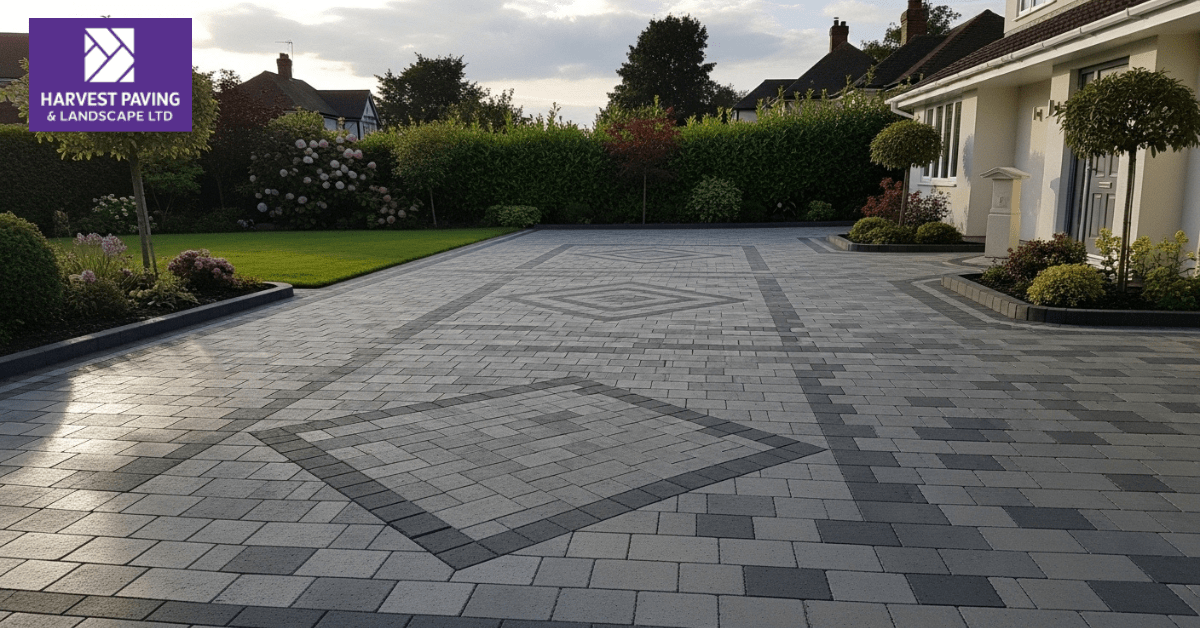
A normal block paving setup includes:
Blocks or Pavers: the bricks you see and walk on.
Bedding Sand: keeps the blocks level and firm.
Jointing Sand: fills the small gaps between the blocks.
Edge Restraints: stop the blocks from moving.
Sub-base: a layer of crushed stone for support.
Geotextile Membrane (optional): helps stop weeds from growing.
For reliable results that last, choose our Local Paving Company in Colchester and nearby areas. we provide expert block paving services for driveways, patios, and garden paths.
Types of Block Paving
1. Concrete Block Paving
Concrete blocks are the most common in Colchester. They’re made from cement and coloured with pigments. They come in many shapes and shades, making them great for driveways, patios, and paths. They’re strong, affordable, and easy to replace.
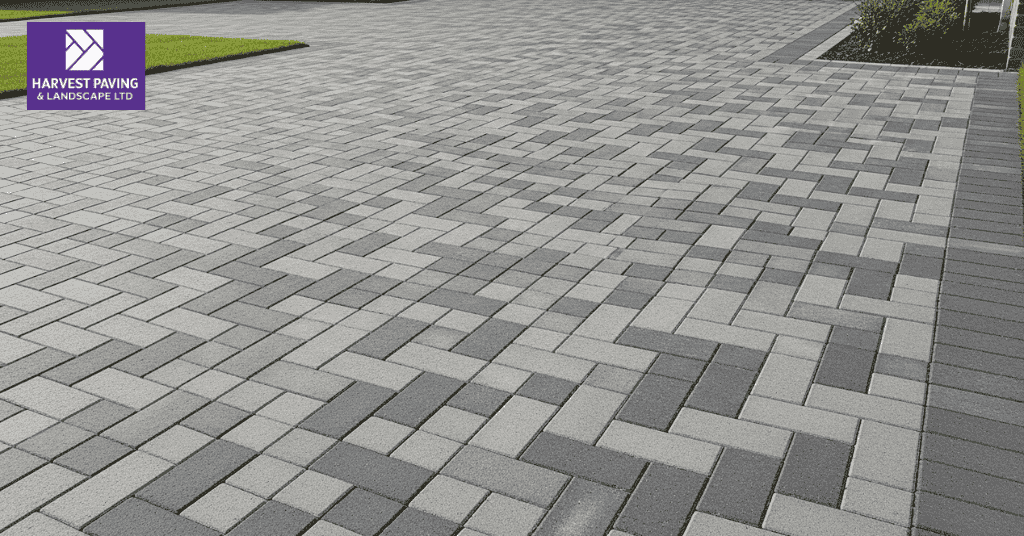
2. Clay Block Paving
Clay blocks are made from natural clay and baked at high heat. They have a rich, deep colour that lasts for years. Clay paving is perfect if you want a warm, traditional look.
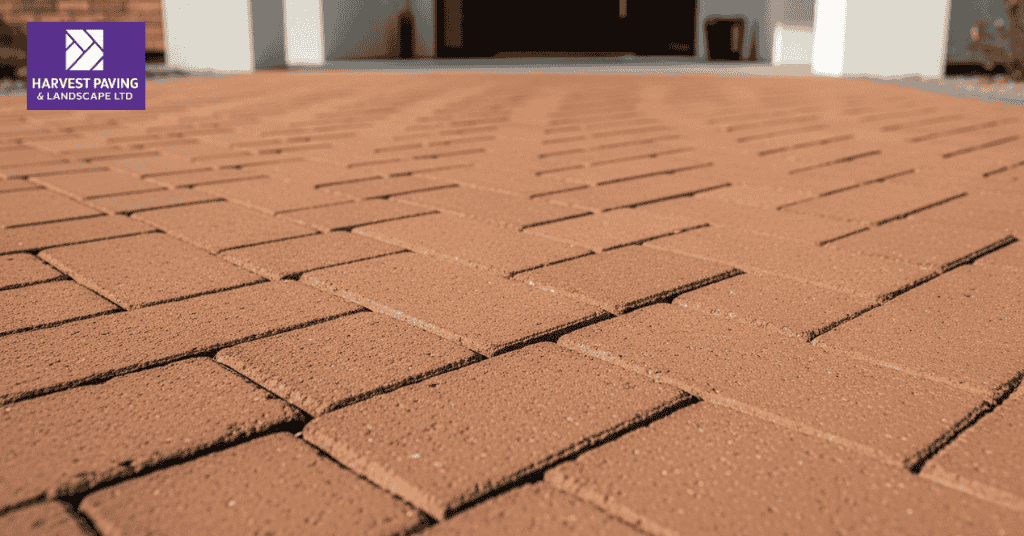
3. Natural Stone Paving
Stone blocks like sandstone, limestone, or granite give a premium and natural look. They’re very strong and long-lasting but cost more than concrete or clay.
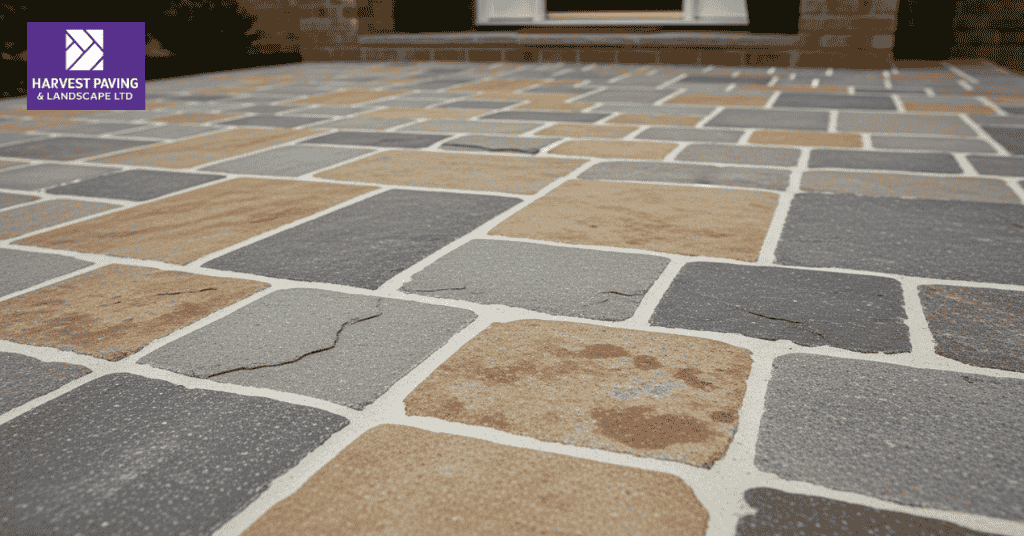
How Block Paving Is Installed?
Here’s a simple step-by-step overview:
- Preparation: Remove existing surfaces and level the ground
- Sub-base: Compact 100–150mm of crushed stone or MOT Type 1
- Bedding Layer: Add and level sharp sand
- Laying Blocks: Start from a straight edge, using multiple packs for colour consistency
- Compaction: Use a plate compactor to settle the blocks
- Jointing: Sweep sand into the gaps and compact again
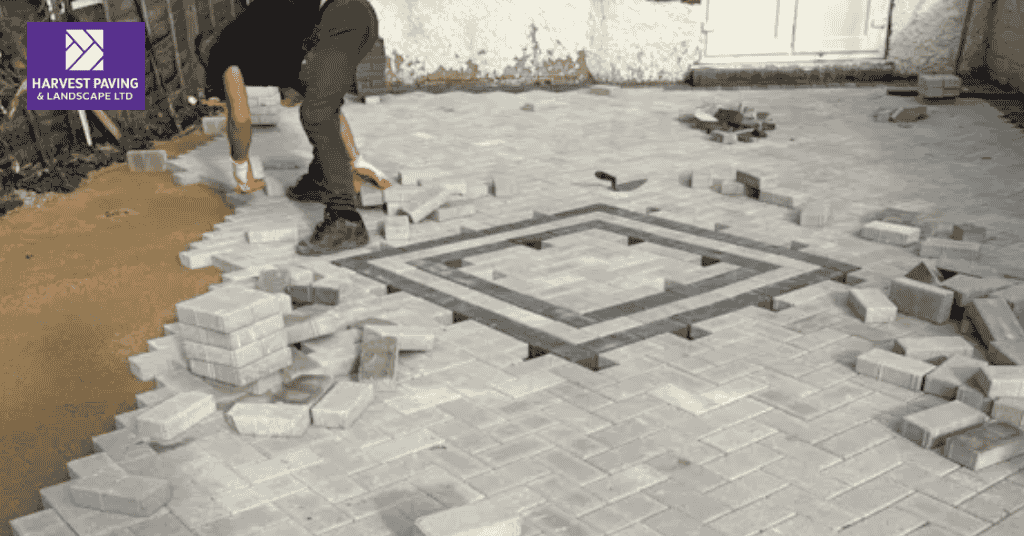
Ready to upgrade your driveway or patio? Explore about our expert block paving service and get a free quote today.
Applications of Block Paving
You can use block paving almost anywhere:
- Residential: Block paved driveways, patios, pathways, pool surrounds
- Commercial: Parking lots, pedestrian areas, plazas, business parks
- Industrial: Factory floors, loading bays, ports, logistics centres
- Public Spaces: Town squares, parks, traffic calming zones, areas around street furniture
Along with block paving, we offer a complete range of outdoor solutions including driveways, patios, and landscaping. Explore our services to see how we can transform your property.
Permeable vs. Impermeable Paving
- Permeable paving allows water to pass through, reducing runoff.
- Impermeable paving blocks water, leading to pooling or drainage issues.
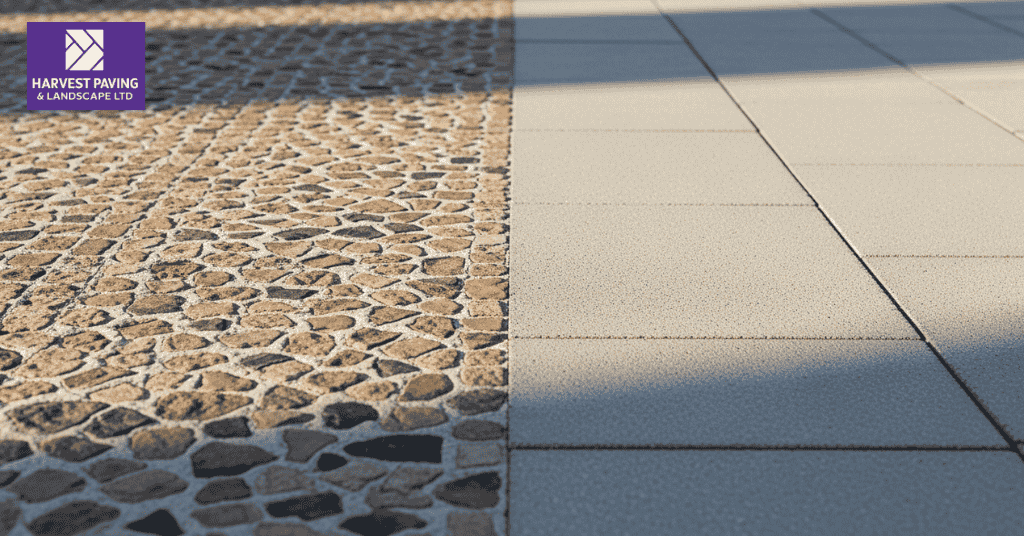
Permeable Paving
Permeable block paving allows water to drain through the surface, reducing the risk of flooding and supporting sustainable urban drainage. The blocks usually have wider joints or gaps, and the sub-base stores water before letting it slowly infiltrate the soil.
Impermeable Paving
Traditional impermeable paving sheds water to drains at the edges. While suitable for most areas, impermeable surfaces can increase surface water runoff.
Choosing the right type: If you live in an area that floods easily, go for permeable paving. If your drainage is already good, non-permeable paving is fine.
Benefits and Design Possibilities of Block Paving
Strong and Long-Lasting: can handle cars and heavy use.
Easy to Repair: just replace one block if it breaks.
Beautiful Designs: many colours, textures, and shapes.
Many Patterns: herringbone, basketweave, or straight lines.
Good Drainage: permeable options help reduce water buildup.
Neat and Stable: interlocking blocks stay in place.
Flexible Style: works well for both modern and classic homes.
Maintenance and Care
Block paving is easy to look after. Sweep it often to remove dirt, refill jointing sand to stop weeds, and pressure wash when needed. You can also seal it to make it shine and protect it from stains. If a block breaks, just replace it, no need to redo the whole area.
Durability and Lifespan
Block paving is known for its longevity. With sound installation and maintenance, it can last 20–25 years or more. Key factors affecting durability include:
- Quality of materials
- Type of traffic (cars, people, etc.)
- Area’s Weather conditions
- Regular maintenance
It lasts longer than many concrete or asphalt surfaces and is easier to fix since you can replace single blocks.
Cost Considerations for Block Paving
- Type of Blocks: The type of blocks, such as concrete, clay, or natural stone, affects both the cost of block paving and its durability.
- Average Cost: On average, block paving costs around £90–£110 per square metre in the UK.
- Driveway Example: For a standard 50m² driveway, you can expect a total cost of about £5,000–£5,500, including materials and installation.
- Area Size and Complexity: Larger or intricately patterned areas require more materials and labour.
- Ground Preparation: Sub-base and drainage work can impact overall cost.
- Labour Costs: Professional block paving installation ensures long-term performance and may vary locally.
- Purpose and Strength: Block paving for driveways requires more robust blocks than patios
- Climate Considerations: Choosing materials that can withstand freeze-thaw cycles helps prevent driveway cracks and extends their lifespan.
- Style and Design: Select block paving colours, textures, and patterns for your property to achieve a cohesive look.
- Regulations: Check local planning and drainage rules before starting.
- Expert Advice: Professional guidance can help optimise design, materials, and installation for cost-effectiveness.
Whether you’re improving your old driveway or planning a new one, our trusted Paving Company delivers quality workmanship, helping homeowners build durable and stylish outdoor spaces.
Conclusion
Block paving is a strong, attractive, and flexible choice for any outdoor space. It improves your home’s look, increases property value, and lasts for decades with the right care. Plus, with eco-friendly options like permeable paving, it’s also kind to the environment.
Whether you want a new driveway, patio, or path, block paving is a smart, lasting investment for your home or business.
FAQs
What is block paving, and how is it different from concrete or asphalt?
Block paving utilizes individual blocks made from concrete, clay, or natural stone, laid in a pattern over a base. Unlike a solid concrete or asphalt surface, it allows flexibility, more straightforward repairs, and offers a more attractive design.
How can I prevent weeds and moss on block paving?
Regular maintenance is key. Sweep the surface regularly, brush sand into the joints, and use a weed or moss killer as needed. Proper drainage and occasional sealing can also help keep the paving clean and weed-free.
What are the benefits of permeable block paving?
Permeable paving allows water to drain through the surface, reducing the risk of flooding and promoting sustainable drainage. It is ideal for areas prone to heavy rainfall or where environmental regulations require sustainable water management.
Can I install block paving myself?
Small projects like garden paths or patios can be DIY-friendly. However, larger areas like driveways or commercial zones are best installed by professionals to ensure proper sub-base, drainage, and long-term durability.
